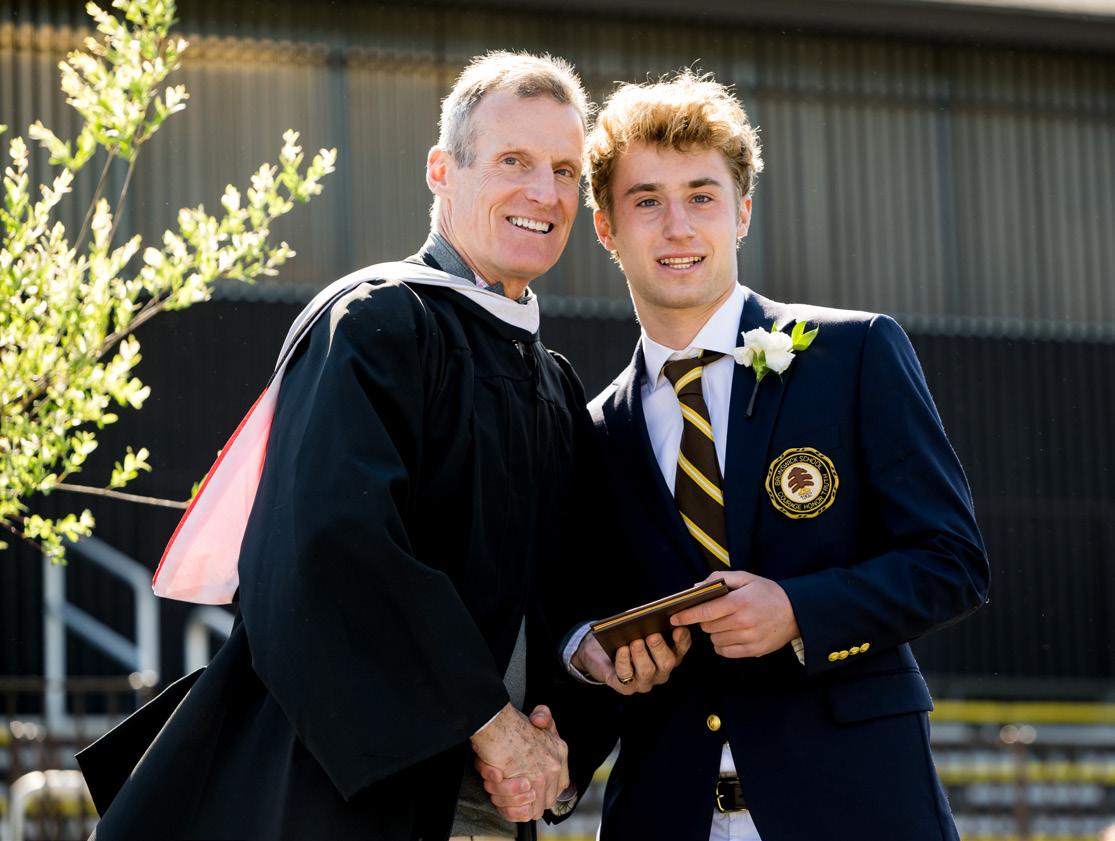
6 minute read
Math Department
PHILOSOPHY & GOALS
The aim of the Brunswick Mathematics Department is to develop in its students strong understanding and skills in the areas of quantitative thinking and mathematics. An understanding of numbers is established at the start of the student’s time at the school, and this is developed continually through the years that follow. The goal of the department is to develop in every student a firm grounding in the basic facts and skills, to extend these skills to advanced topics, and to encourage the initiative required for the solution of mathematical problems. A wide range of courses is offered in order to accommodate all students, including those who need the challenge of high-level content. The department aims to produce students who fulfill their potential in math, having knowledge at their fingertips and the courage and ability to solve problems.
▶ A MATH DEPARTMENT MOTTO that now adorns all Upper and Middle School math classrooms has students considering how to set aside rote memorization in pursuit of a deeper understanding of mathematical concepts.
The motto — There’s a reason, not a rule — had its origins in some good old-fashioned free-association among teachers in the Math Department.
It grew from a discussion that Michael and Anne Allwood, both Upper School math teachers, were having at home about the core of good math learning — with Anne finally suggesting that when it comes to math education, the goal should be having reasons instead of rules.
That discussion made its way to a Math Department professional development event several years ago, when teacher and Grade Five Dean Judy Gallagher polished the idea and coined the phrase into its memorable present incarnation. Posters were made up and appeared in classrooms beginning in September 2021.
“It truly is the essence of good math learning — understanding the reason for what we do,” said Michael Allwood. “The kids really love it — the idea of not memorizing. It’s been great!” continued on page 8
▶ BRUNSWICK’S UPPER SCHOOL MATH TEAM had the most successful year in its history, capturing the New England championship in late April after sweeping both the state and regional competitions earlier in the season.
The team traveled to Shrewsbury High School in Massachusetts to take part in the New England math team competition in late April, emerging victorious in the small-school division.
Twenty-six schools participated, having qualified through highly distinguished performances in their state meets or local math leagues, and schools are categorized by size — large, medium, and small.
“To date, this is the absolute peak of achievement for Brunswick’s Upper School math team, and the six students who represented the school, along with the entire group of 20 students who are involved in the program, are absolutely delighted,” said coach Michael Allwood.
Brunswick’s team — comprised of Ajay Bagaria ’24, Thomas Ewald ’24, William Ewald ’23, Vikram Sarkar ’26, Andrew Tu ’24, and Jack Whitney-Epstein ’26 — earned a score of 73. In second place was Massachusetts Academy, a math-and-science-focused magnet school, with 57 points, and Hopkins placed third with 53.
Math Department continued from page 7
Additionally, Brunswick’s Vikram Sarkar earned a perfect 18/18, believed to be the first-ever perfect score from a Brunswick student in the New England meet. The win capped a thrilling year for the Upper School math team; Brunswick finished in first at Connecticut’s State Association of Math Leagues annual match in April, with the Bruins emerging on top among 44 public and private schools. Brunswick’s six-student team placed first in the small-school division.
“And as large-school participants consisted of eight students, a comparison was done among all schools on a per-student basis, which determined Brunswick to be first among all schools in the state,” Allwood said. “Sarkar and Whitney-Epstein earned perfect scores in a very challenging match.”
The Brunswick team also finished first in the Fairfield County Math League after its six-match season of competition.
▶ A NEW MIDDLE SCHOOL
MATH TEACHER brings 20 years of teaching to his new role at Brunswick — as well as six years as a US Marine Corps officer, 15 years in investment banking, and a lifetime in sailing capped by recent stints leading summer sailing programs in Connecticut and Maine.
Geoff McCuskey grew up in Cincinnati, Ohio, earned a degree in political science and international relations from the University of Cincinnati, and joined the US Marines in 1982. He served in Quantico, Pensacola, Hawaii, Scotland, and Japan.
After the Marines, McCuskey earned an MBA in investment banking at Pennsylvania State University and went on to a 15-year career in mergers and acquisitions and corporate finance in New York.

Marriage and two children, now ages 22 and 23, led him to shift careers once again, this time to teaching, serving most recently at the Middlebrook Middle School in Wilton, where he taught eighth grade math for the past six years.
McCuskey said he jumped at the chance to come to Brunswick.
“It’s a totally different environment teaching at Brunswick,” he said. “There are so many things that make Brunswick distinctive — character development, excellence in academics, excellence in sports.
“It’s been a wonderful first year,” he said. “This is an incredibly supportive environment to teach in. I’ve enjoyed getting to know the boys and all the teachers.”
McCuskey is also serving as an assistant coach of the Upper School sailing team, which emerged as New England champion in a May regatta at MIT, winning the President’s Trophy for the first time in program history. Two weeks later, the team took ninth at the Baker High School National Championship in Minnesota.
At the Middle School, McCuskey teaches seventh grade algebra and eighth grade honors geometry. He also coaches Middle School hockey and serves as a seventh grade advisor.
▶ THIS YEAR’S RECIPIENT of the Thomas A. Shields Award went to a student who tackled high level college math as he also helped lead the Upper School math team to its most successful year ever.
William Ewald ’23 was honored as this year’s most outstanding senior mathematics student after pursuing an advanced curriculum throughout high school. He took Linear Algebra as a freshman, four years ahead of schedule. Various encounters with continued on page 9

Math Department continued from page 8 calculus followed, first with one variable and then with two or three.
“Any obstacles were met with the same sharp mind, steely determination, and scholarly habits,” said Richard Dobbins, Math Department chair.
Finally, as a senior, Ewald took on the intellectual challenge of Real Analysis, a second- or third-year course for college math majors that consists entirely of mathematical proofs.
“His teacher hailed his commitment and celebrated the progress he made this year, while also praising the collaborative manner in which approached the work,” Dobbins said.
▶ PROBLEM SOLVING has come into sharper focus at the Lower School thanks to a program developed several years ago by Lower & Pre School Math Specialist Jean Dobbs.
Known by its acronym CORE — Collaborate, Organize, Review, and Evaluate — the program was developed in response to the need for more problem solving using logical reasoning and divergent thinking.
“The problems are designed to focus on the process, rather than the answer,” said Dobbs.
CORE is scaffolded by grade level, with first graders kicking off the program with the letter C — Collaboration.
“The boys observe teachers share ideas and practice talking about and modifying strategies to work together to set up a problem,” said Dobbs.
In second grade, boys continue to practice collaboration and are introduced to the second letter, O — Organization.
“We talk about how to organize the steps in their problem using labels and a definite format (charts, pictures, computations, etc.) so that someone could understand the problem just by looking at their work and process, without necessarily having read the problem.”
Third grade sees boys add R — Reviewing their work — to their problem-solving tool kit. Students are encouraged to review each step to see if they have followed a logical scope and sequence.
Finally, in fourth grade, boys conclude by Evaluating their work.
“They try to determine if the strategy/format they used was productive, if there might have been a better way to set up the problem, and if they would choose another plan if they were to complete a similar problem in the future,” Dobbs said.
“I consider the problem a success if the boys are engaged and the end results yield a variety of different ways to set up the problem.”
Dobbs said the problems in CORE are less structured than the more formulaic computations that they learn on a daily basis, and for the most part the boys enjoy them.
“It’s hard to explain how much thinking, collaborating, planning, and organizing go into solving these problems without observing the boys in action!”
▶ IN PRE-K, most math lessons revolve around the letter-of-the-week program, and J week brings the arrival of jelly beans — making it among the favorites!

“During J week, we put our counting, sorting, number writing, and graphing skills together with yummy jelly beans,” said Deb Schwartz, Pre-K teacher. “The boys each get a cup of jelly beans. Their first task is to count how many jelly beans they have. Next, they sort them by color and then graph how many of each color jelly bean they have. Then, the boys write the corresponding number and answer graphing questions — such as which jelly bean was the most/least common.
“Finally, they get to eat them! What a fun learning experience for our boys!”







